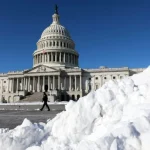

The number of newly enrolled college undergraduates declined yet again, dashing hopes that the fall 2022 semester would bring about a rebound in college enrollment following precipitous declines during the pandemic-affected school years.
The semester enrollment report from the National Student Clearinghouse Research Center released Thursday showed overall undergraduate enrollment fell by 1.1% in the fall 2022 semester, in line with pre-pandemic trends in declining enrollment. Graduate enrollment declined by 1%, reversing a 2.7% increase in 2021. However, overall graduate enrollment remains above pre-pandemic levels.
COLLEGE ENROLLMENT DROPS 1.4M STUDENTS, THREATENING LONG-TERM STABILITY OF HIGHER EDUCATION
These data are the first indicator that high school graduates that elected to forgo college during the COVID-19 pandemic are still not pursuing post-secondary education and dashed hopes that a new, mostly pandemic-free school year would provide a rebound. It is estimated that schools have lost over 1.4 million students since the fall 2020 semester.
“After two straight years of historically large losses, it is particularly troubling that numbers are still falling, especially among freshmen,” Doug Shapiro, the executive director of the National Student Clearinghouse Research Center, said in a press release. “Although the decline has slowed and there are some bright spots, a path back to pre-pandemic enrollment levels is growing further out of reach.”
The data are based on reports from 63% of the nation’s institutions of higher education, serving 10.3 million students, the research center said. Private for-profit institutions saw the largest decline at 2.5%, while enrollment at public universities declined by 1.6%, and private nonprofit college enrollment declined by 0.9%.
The trends largely held true across all geographic areas. Alaska, Michigan, Kansas, Missouri, and Nevada saw the steepest declines, while a handful of states, led by New Hampshire at 6.8%, saw overall increases in undergraduate enrollment.
Among the few positives in the data was an 11.5% increase in students taking dual enrollment courses that helped stabilize the decline in community college enrollment at a minimal 0.4% decrease from 2021. Additionally, Hispanic undergraduate enrollment actually increased by 1.2%.
In contrast, enrollment for white undergraduate students declined by 3.6%, for black students by 1.6%, and for Asian students by 0.8%. The declines for each racial demographic were lower than in 2021, when enrollment among white students fell by 6%, black student enrollment fell by 5.4%, and Hispanic student enrollment declined by 3.3%.
CLICK HERE TO READ MORE FROM THE WASHINGTON EXAMINER
In a sign that more students could be turning to online higher education opportunities, enrollment at primarily online colleges increased by 3.2%, defying overall trends. Online colleges have seen a whopping 23.4% increase in enrollment from students aged 18-20 over the past two years.







